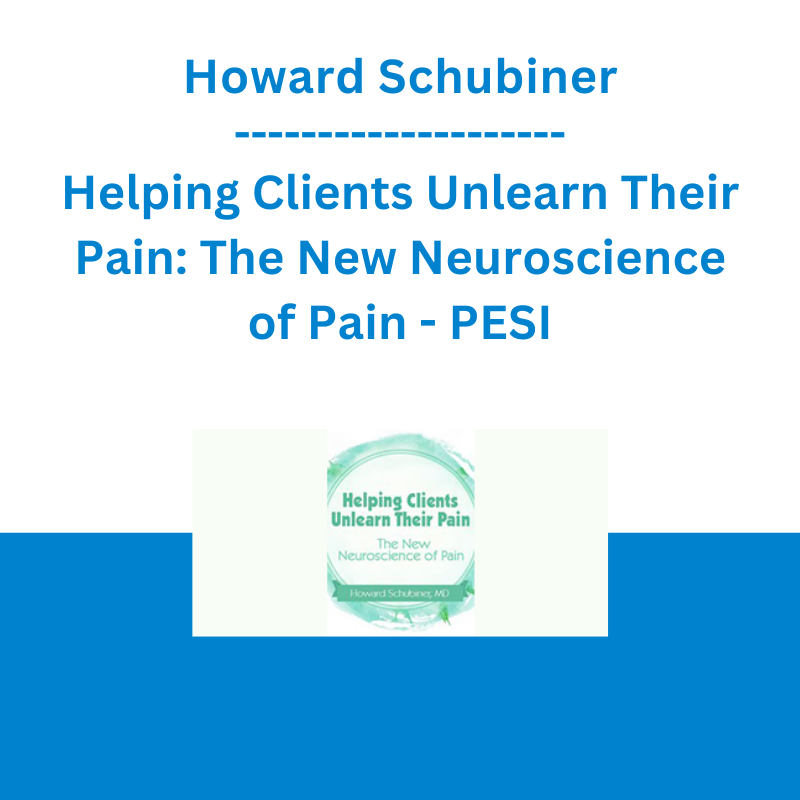*** Proof of Product ***
Exploring the Essential Features of “Howard Schubiner – Helping Clients Unlearn Their Pain: The New Neuroscience of Pain – PESI”
Helping Clients Unlearn Their Pain: The New Neuroscience of Pain
Speaker: Howard Schubiner, MD
Duration: 1 Hour 53 Minutes
Format: Audio and Video
Description
Nearly half of all clients in therapy have physical pain, yet for the majority of these individuals, their pain has no clear medical cause. This is particularly true for those with back and neck pain, headaches, fibromyalgia, and abdominal-pelvic pain. Neuroscientists now know that all pain is constructed by the brain’s alarm mechanism, which can be activated by either physical injury or perceived emotional threat. This workshop will provide tools and step-by-step techniques to help therapists simultaneously address physical and emotional pain.
Speaker
Howard Schubiner, MD
Howard Schubiner, MD, is an internist at Providence Hospital in Michigan and a professor at Michigan State University. He’s the author of Unlearn Your Pain, Unlearn Your Anxiety and Depression and coauthor of Hidden from View.
Speaker Disclosures:
Financial: Howard Schubiner is an attending physician at Children’s Hospital of Michigan; harper Hospital; Hutzel Hospital; and Detroit Receiving Hospital. He is a faculty member at Providence Hospital. He is an author for Mind Body Publishing and receives royalties. Dr. Schubiner receives a speaking honorarium from PESI, Inc. He has no relevant financial relationships with ineligible organizations.
Non-financial: Howard Schubiner is a Fellow for the American Academy Pediatrics; a Fellow for the American College of Physicians; and a Fellow for the Society for Adolescent Medicine.
Outline
Knowledge about Psychophysiologic Disorders (PPD)
- How is pain produced and processed in the conscious and subconscious brain
- What are some of the common manifestations of PPD
- Relationship between stressful life events and PPD
- Overview of treatment of PPD
How to assess if someone has PPD, including examination skills if appropriate (Medical assessment)
- Medical history
- Review of records and imaging studies
- The search for discrepancies
- Review of symptoms checklist lifetime
- Medical examination or review of medical examinations
How to determine the psychological cause of PPD
- Early childhood history—priming events
- Teen and early adult history—triggering events
- Later life history, search for themes and patterns
- Connection between onset and exacerbation of symptoms and stressful life events
How to educate patients and personalize information about PPD
- Explaining PPD 101—the information
- Review themes and relate life events to onset and exacerbation of PPD symptoms
- Obtain feedback and answer questions
How to implement the basic cognitive and behavioral elements of Treatment
- Education as a basis of treatment
- Understanding the concepts and applying them personally
- Believing in them and self-confidence to allay doubts
- Developing self-confidence for successful recovery
- Affirmations for recovery
- Challenging symptoms
- Conditioned responses and outcome independence
Description of expressive writing exercises, handouts only
- List of writing techniques (Lists):
- Free writing
- Unsent letters
- Dialogues
- Gratitude
- Forgiveness
- Barriers to recovery
- Responding to life situations
- Writing a new life narrative
Description of the role of meditative exercises, handouts only
- Mindfulness practices
- Attending to emotional states
- Decreasing self-induced suffering
- Tolerating symptoms as transient events
- Guided meditations
How to guide a PPD patient in emotional awareness and expression exercises
- Basic principles
- Description of steps in the process
- Demonstration of the process
Conclusions, Questions and Answers
Objectives
- Discover an approach to distinguishing clients with psychophysiologic pain from those with more structurally caused pain
- Discover how to help clients understand the psychophysiological process for pain in ways that encourage their commitment to positive action
- Discover how to use mindfulness-based cognitive-behavioral techniques to address psychophysiologic pain in clients
Target Audience
- Psychologists
- Physicians
- Addiction Counselors
- Counselors
- Social Workers
- Marriage & Family Therapists
- Nurses
- Other Behavioral Health Professionals
Please see the full list of alternative group-buy courses available here: https://lunacourse.com/shop/









